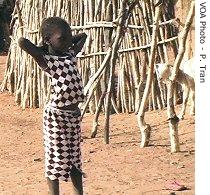-
(单词翻译:双击或拖选)
Geneva
31 August 2007
The U.N. refugee agency is appealing for seven million dollars to fund the voluntary repatriation1 of 24,000 Mauritanian refugees from Senegal and Mali. The UNHCR, which is launching the appeal Friday, says this return will help resolve one of the most protracted2 refugee situations in the world. Lisa Schlein reports for VOA from UNHCR headquarters in Geneva.
 |
| A refugee girl in Dodel, a Mauritanian refugee camp in Senegal |
U.N. refugee spokeswoman, Jennifer Pagonis, says it is now possible to return the refugees because the newly elected Mauritanian government has made a point of welcoming the exiles home.
She says this is wonderful news for thousands of Mauritanians who have not seen their homeland in many years. But, she notes the logistics of getting them home are daunting3.
"They are spread along the Senegal river about 500 kilometers, I think, along this river on many different settlements. So, getting all these people together who have been living there for a couple of decades now and getting transport across the river," said Pagonis. "We had to take into account the rainy season before all this would be possible. And, then getting them from the other side of the border back to their areas of origin. They need to have off road vehicles if they are far off the main roads. And so we need off road vehicles to be able to get them back home."
In April 1989, a long-standing border dispute between Mauritania and Senegal escalated4 into ethnic5 violence. Some 60,000 Mauritanians fled to Senegal and Mali., most settled in hundreds of villages along the Senegal River valley. Many Mauritanian citizens were expelled from Senegal to Mauritania.
The UNHCR provided assistance to the Mauritanian refugees in northern Senegal until 1995. Pagonis says her agency helped reintegrate some 35,000 Mauritanians who returned home on their own between 1996 and 1998.
In the meantime, she says many of the Mauritanian refugees have carved out a life for themselves in Senegal. She says she believes a number of people will initially6 be reluctant to register for voluntary repatriation. She adds that is a normal reaction.
"A bunch are desperate to get back," said Pagonis. "Often they are older people. And, then there are others who, once they see people going back and that they feel secure and happy when they get back there, they also decide they would also like to go back home. So, I imagine there will be an initial sort of rush of people and that will increase as time goes on."
Pagonis says the Mauritanian government has given assurances that returnees will enjoy the same rights and have access to the same services as other Mauritanian nationals. She says this includes access to documentation and participation7 in social and economic activities.
 收听单词发音
收听单词发音
1
repatriation

|
|
| n.遣送回国,归国 | |
参考例句: |
|
|
|
2
protracted

|
|
| adj.拖延的;延长的v.拖延“protract”的过去式和过去分词 | |
参考例句: |
|
|
|
3
daunting

|
|
| adj.使人畏缩的 | |
参考例句: |
|
|
|
4
escalated

|
|
| v.(使)逐步升级( escalate的过去式和过去分词 );(使)逐步扩大;(使)更高;(使)更大 | |
参考例句: |
|
|
|
5
ethnic

|
|
| adj.人种的,种族的,异教徒的 | |
参考例句: |
|
|
|
6
initially

|
|
| adv.最初,开始 | |
参考例句: |
|
|
|
7
participation

|
|
| n.参与,参加,分享 | |
参考例句: |
|
|
|















